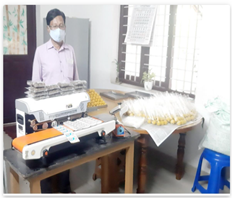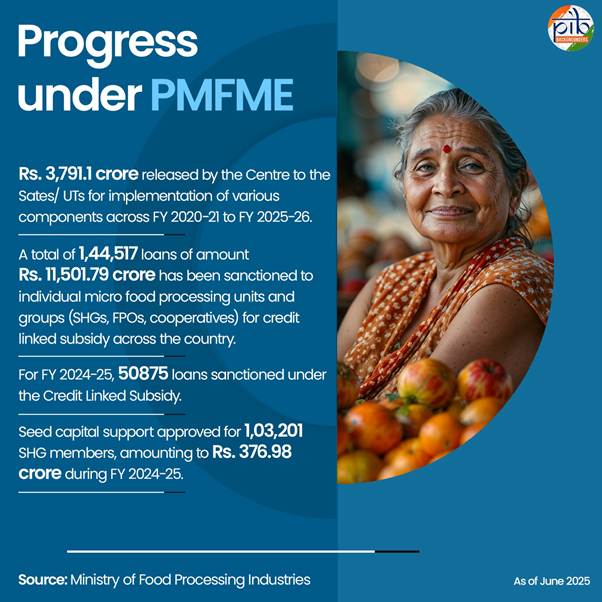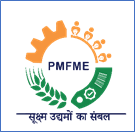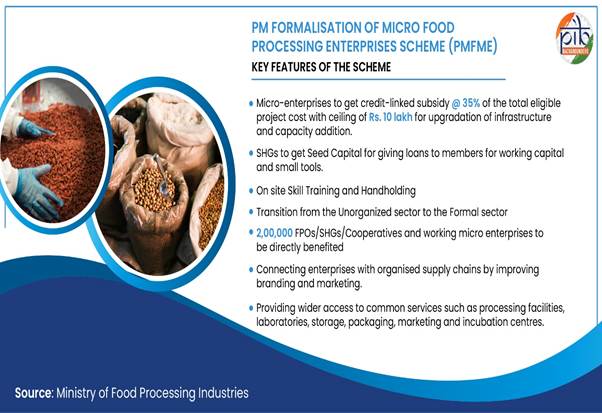Farmer's Welfare
Pradhan Mantri Formalisation of Micro Food Processing Enterprises (PMFME)
“Vocal for Local in Food Processing Sector”
Posted On:
02 SEP 2025 4:13PM
Key Takeaways
As of June 2025,
- Rs. 3,791.1 crore released by the Centre to the Sates/ UTs for implementation of various components across FY 2020-21 to FY 2025-26.
- A total of 1,44,517 loans of amount Rs. 11,501.79 crore has been sanctioned to individual micro food processing units and groups for credit linked subsidy across the country.
- 1,16,666 beneficiaries have been trained across the country under the PMFME scheme.
- For FY 2024-25, 50875 loans sanctioned under the Credit Linked Subsidy.
- Seed capital support approved for 1,03,201 SHG members, amounting to ₹376.98
Introduction

Ruby Fresh Snacks in Ernakulam, Kerala, tells the story of how a small dream became a thriving enterprise. Founded by Mr. P M Jaleel in 2011 with groundnut laddoos, the unit grew with the support of the PM Formalisation of Micro Food Processing Enterprises Scheme. A loan of over 3 lakh rupees in 2021 helped him buy new machines, double production, and expand his product range. Daily profits rose from about 12,000 rupees to nearly 20,000, and his turnover crossed 32 lakh rupees in 2021-22. Today, Ruby Fresh Snacks is not only a source of quality local treats but also a symbol of how government support can transform small entrepreneurs into inspiring success stories.


The Pradhan Mantri Formalisation of Micro Food Processing Enterprises Scheme was launched on 29 June 2020. It is a Centrally Sponsored Scheme that focuses on the growth and formalisation of micro food units across the country. The scheme is part of the Atmanirbhar Bharat Abhiyaan and supports the Vocal for Local vision in the food processing sector. It provides financial, technical and business assistance to entrepreneurs for setting up new units or upgrading existing ones. The scheme runs from 2020-21 to 2025-26 with an outlay of Rs. 10,000 crores. Its goal is to make micro enterprises more competitive, bring them into the organised sector and unlock new opportunities for growth.
The expenditure under the scheme is to be shared in 60:40 ratio between Central and State Governments, in 90:10 ratio with North Eastern and Himalayan States, 60:40 ratio with UTs with legislature and 100% by the Center for other UTs.
The scheme aims to provide direct support to 2 lakh micro food processing units through credit linked subsidies. It also seeks to create common infrastructure and strengthen institutional support to drive faster growth in the sector.
India’s food processing industry has seen a remarkable growth over the past 11 years, shaped by its strong farm base, growing demand, and supportive government policies. The country is set to become a global leader in this sector, with steady growth ahead. Agriculture remains the backbone of food processing, while the sector itself has become vital to the economy through its rising share in GDP, jobs, and exports.
As of July 2025, for FY 2024-25, agriculture and processed food exports reached approximately USD 49.4 billion with processed food exports constituting around 20.4%, positioning India as a rising global leader in food processing. The number of registered food business operators has expanded from 25 lakh to 64 lakh, reflecting growing formalisation. Infrastructure has also strengthened with establishing 24 mega food parks, 22 agro-processing clusters and completing 289 cold chain projects and 305 processing and preservation units, creating significant additional capacity. Further, 10 projects under Operation Greens have enhanced value addition, while 225 R&D projects have yielded 20 patents and 52 commercialised technologies.

Key components of the Scheme
The program has 4 broad components addressing the needs of the sector:
Support to individuals and groups of micro-enterprises.
Support for Individual Units
- Credit-linked capital subsidy of 35% of the project cost.
- Maximum ceiling of ₹10 lakh per unit.
- Minimum 10% beneficiary contribution, balance through bank loan.
Support for Farmer Producer Organisations (FPOs) and Producer Co-operatives
- Grant support at 35% with credit linkage.
- Training and capacity building provided.
- Maximum funding as prescribed under scheme norms.
Support for Self-Help Groups (SHGs)
Seed Capital Support
- ₹40,000 per SHG member for working capital and small tools.
- Priority for SHGs working on ODOP (One District One Approach) products.
- Seed capital given at federation level and disbursed as repayable loan to members.
Branding and Marketing Support
Marketing and branding support is extended to groups of FPOs, SHGs, Co-operatives or SPVs (Special Purpose Vehicles) of micro food processing units. This assistance follows the ODOP (One District One Approach) approach and is limited to products promoted at the State or regional level.
Eligible items for support
- Training in marketing fully funded under the scheme.
- Development of common brand, packaging and standardisation.
- Tie-ups with national and regional retail chains and state institutions encouraged.
- Quality control measures to ensure products meet set standards.
Detailed Project Reports (DPRs)
A Detailed Project Report (DPR) is required for proposals. It should include project details such as product profile, strategy, quality control, aggregation of produce, packaging and branding, pricing, promotion, storage, and marketing channels. Plans for sales growth must also be outlined.
Financial support of up to ₹5 lakh is available from the State Nodal Agency (SNA) for preparing DPRs related to marketing and branding.
The DPR should also carry a flow chart showing activities from raw material procurement to marketing. It must highlight quality control points and present a five-year plan covering promotional work, expansion of producer participation, and turnover growth.
As part of the scheme, the Ministry provides Guidelines (Model DPR’s) for the preparation of Branding and Marketing DPRs. This helps entrepreneurs, FPOs, SHGs, cooperatives, or SPVs develop well-structured proposals with templates, technical terms of reference, and formats required to apply for branding and marketing support.
Support for Common Infrastructure
The following common infrastructure are being funded under the Scheme:
- Facilities for assaying agricultural produce, sorting, grading, warehousing, and cold storage at the farm gate.
- Common processing units for ODOP produce.
- Incubation centres with one or more product lines, available to smaller units on hire. Incubation centres may also be used partly for training. All incubation centres to be run on a commercial basis.
Under the PMFME Scheme, Component wise total number of units approved till 30th June 2025, are as follows:
|
S. No.
|
Component
|
No. of Applications Sanctioned
|
Amount Sanctioned (Rs. in Crore)
|
|
1.
|
Credit Linked Subsidy
|
1,44,517
|
11501.79
|
|
2.
|
Seed Capital
|
3,48,907
|
1182.48
|
|
3.
|
Common Infrastructure
|
93
|
187.20
|
|
4.
|
Branding & Marketing
|
27
|
82.82
|
Capacity Building & Research
Capacity building and training form an essential part of upgrading technology and bringing micro food processing units into the formal system. At the national level, National Institute for Food Technology Entrepreneurship and Management (NIFTEM) and Indian Institute of Food Processing Technology (IIFPT) lead capacity building and research, with financial support provided for these activities. In collaboration with State-level technical institutes, they offer training and research support to selected enterprises, groups, and clusters. Specialised institutions under ICAR, CSIR, and premier institutes like Defence Food Research Laboratory (DFRL) and Central Food Technological Research Institute (CFTRI) also partner in delivering product-specific training and research across the country.
ODOP focus
The scheme follows the One District One Product (ODOP) approach to scale up procurement, services, and marketing. States identify products, with priority on perishables such as fruits, vegetables, spices, fisheries, and traditional foods like honey and turmeric. Support is focused on processing, storage, branding, and reducing wastage. Capital investment is prioritised for ODOP units, while new enterprises are eligible only for ODOP products. The approach complements cluster-based initiatives under the Agriculture Export Policy and Agriculture Ministry, ensuring stronger value chains and common facilities.
Conclusion
The PMFME Scheme marks a major step in strengthening micro food enterprises and unlocking the potential of local produce. Through its ODOP focus, common infrastructure, skill training, and access to credit, it provides small entrepreneurs with the tools to grow and compete. By reducing wastage, improving value addition, and promoting branding, the scheme not only boosts farmers’ and producers’ incomes but also creates jobs and supports rural development. It stands as a bridge between tradition and modern markets, driving sustainable and inclusive growth in the food processing sector.
References
Ministry of Food Processing Industries
https://pmfme.mofpi.gov.in/newsletters/success_stories/RubyFreshSnacks.html
https://pmfme.mofpi.gov.in/pmfme/#/Home-Page
https://pmfme.mofpi.gov.in/newsletters/docs/SchemeGuidelines.pdf
https://pmfme.mofpi.gov.in/pmfme/#
https://pmfme.mofpi.gov.in/pmfme/newsletters/docs/Guidelines_for_the_preparation_of_Branding_and_Marketing_DPR_for_PMFME.pdf
myScheme Portal
https://www.myscheme.gov.in/schemes/pmfmpe
https://www.myscheme.gov.in/schemes/pmfmpe
PIB Press Release
https://www.pib.gov.in/PressReleasePage.aspx?PRID=2148505
https://www.pib.gov.in/PressReleasePage.aspx?PRID=2150877
https://www.pib.gov.in/PressReleasePage.aspx?PRID=2159014
https://www.pib.gov.in/PressReleasePage.aspx?PRID=2150881
https://www.pib.gov.in/PressReleasePage.aspx?PRID=2154110
https://www.pib.gov.in/FactsheetDetails.aspx?Id=149246
Click here to see pdf
****
SK/SM
(Explainer ID: 155134)
आगंतुक पटल : 3649
Provide suggestions / comments